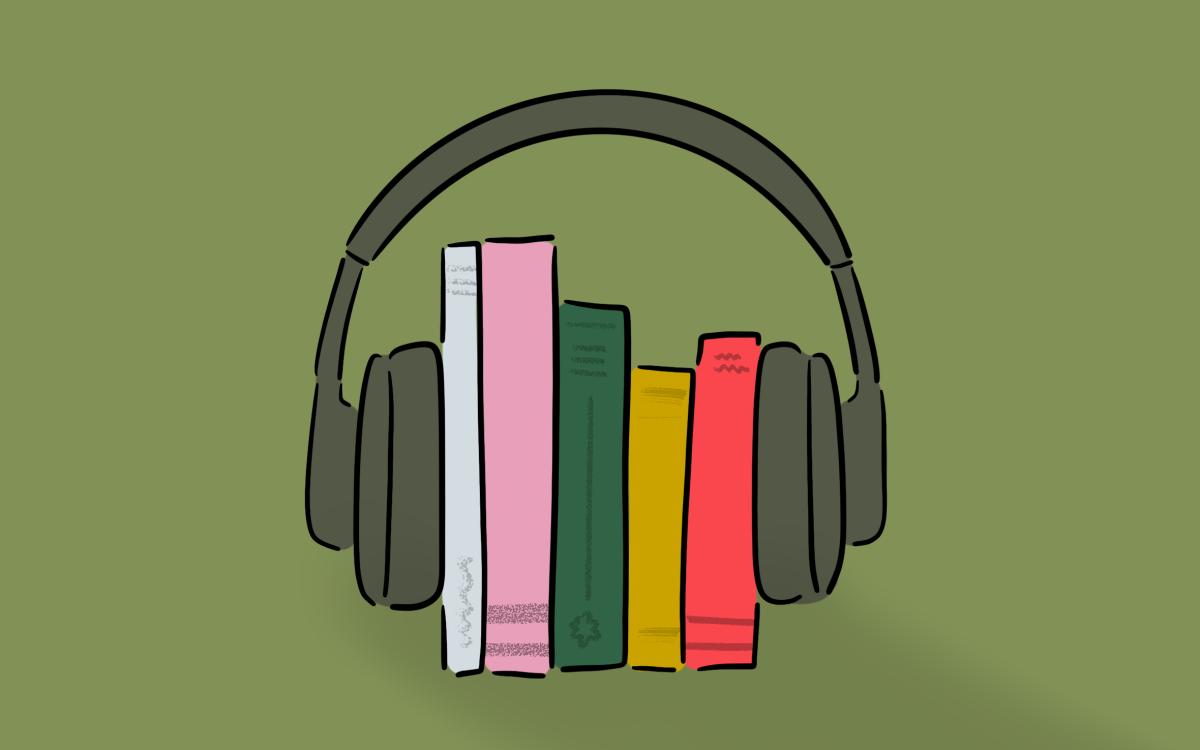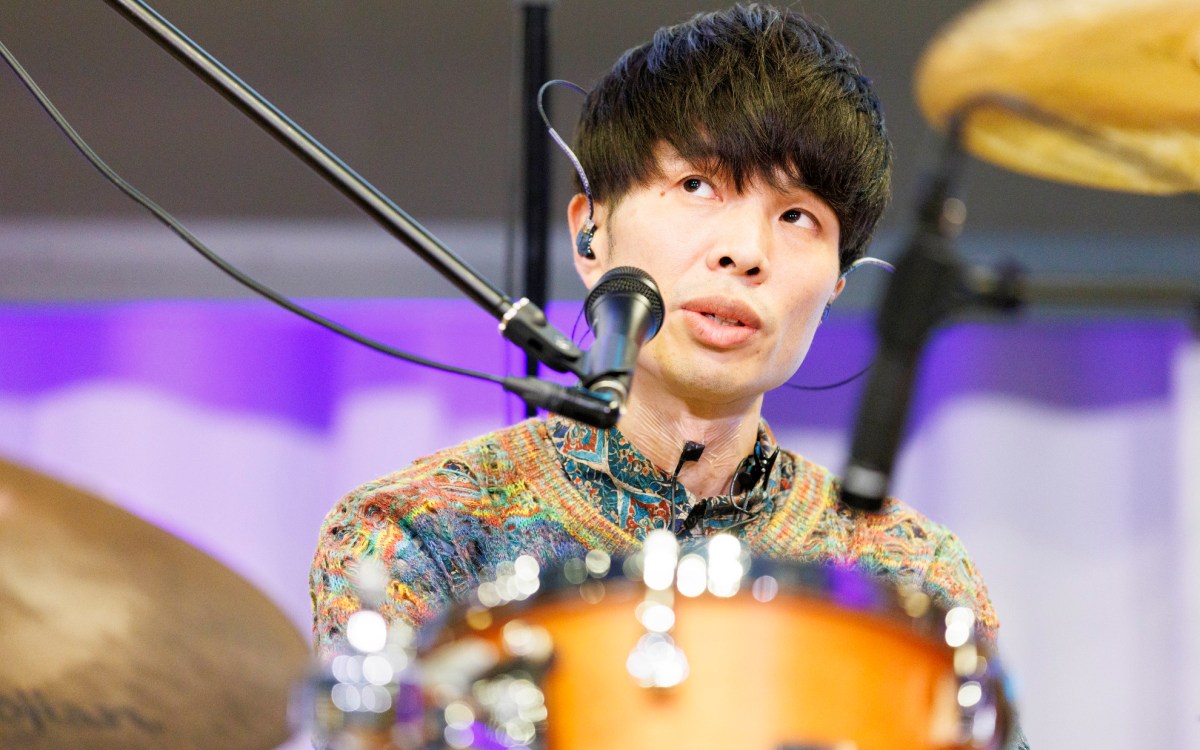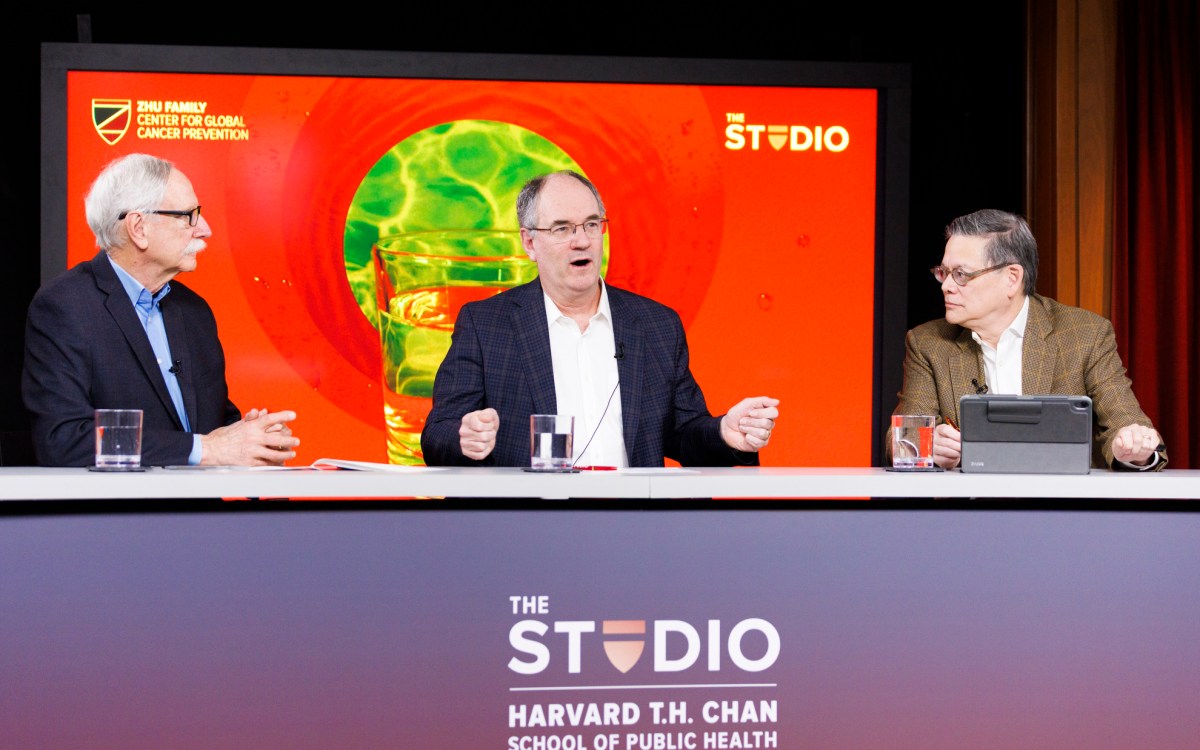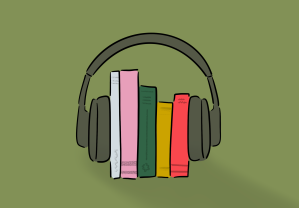Arts & Culture
-

Audiobooks don’t really count as reading? Think again.
Education scholars say rigor, learning same as paper, stigma an unnecessary hurdle
-

Retelling Frederick Douglass’ story, with a soundtrack
Senior composes musical about abolitionist’s early life
-

‘The sound stopped suddenly’
After rare condition robbed drummer of ability to play music, science led him back
-

Moved by what’s missing in Homer’s ‘Harrow’
Curator launches series steeped in U.S. history
-

Tina Fey’s keys to a good joke: Snark, confidence, surprise
Comedian keeps Harvard crowd laughing with longtime co-writer Robert Carlock ’95
-

How Bad Bunny rocketed to global stardom
Music scholar charts ‘remarkable’ rise that transcended language barriers and cultural stigma
-
‘Accidental opera composer’ speaks
As a young man, John Adams didn’t like opera. “I never listened to opera as a kid. I didn’t like the operatic voice or the stiff posturing of opera performances.”
-
In brief
Concert to honor music faculty A farewell concert featuring the music of Harvard Department of Music faculty Julian Anderson and Joshua Fineberg will be held May 21 at 8 p.m. in John Knowles Paine Concert Hall. Anderson, the Fanny P. Mason Professor of Music, and Fineberg, the John L. Loeb Associate Professor of the Humanities, will be leaving the University at the end of the academic year.
-
Heading disaster off at the pass
Before Hurricane Katrina, you could walk along a street in New Orleans and look up to see a ship glide by — with an ocean of water held in check by just one dike.
-
Treasures of Dental School’s old museum opened wide at exhibit
The Harvard Dental Museum once held 14,000 specimens, everything from Ralph Waldo Emerson’s dentures to a prehistoric mastodon’s tusk measuring 11 feet in length and weighing 300 pounds.
-
Peabody teams will scan other endangered monuments
By January, the Peabody Museum’s Corpus of Maya Hieroglyphic Inscriptions Program hopes to be in Copán, Honduras, scanning the imposing but fragile hieroglyphic stairway, the longest inscription in the New World.
-
Scholar: Cave paintings show religious sophistication
A picture may be worth a thousand words, but for Catherine Perlès, cave paintings provide a link to understanding thousands of years of human history and thought. In examining cave paintings in Western Europe and archaeological sites in the Near East, Perlès said that the similarities and differences between the artifacts shows that, contrary to a controversial theory by archaeologist Jacque Cauvin, human belief in gods pre-existed the birth of agriculture and the cultivation of animals.
-
Humanists gather with evangelical fervor
A priest, a rabbi, and a minister walk into a … humanist conference.
-
This month in Harvard history
April 1965 – April 30, 1975
-
William White Howells
At a Meeting of the Faculty of Arts and Sciences on April 10, 2007, the Minute honoring the life and service of the late William White Howells, Professor of Anthropology, Emeritus, was placed upon the records. Howells is best known for his work on human cranial variation and the analytical use of multivariate statistical techniques.
-
OfA announces undergraduate prize winners
The Office for the Arts at Harvard (OfA) and the Council on the Arts at Harvard, a standing committee of the Faculty of Arts and Sciences, have announced the winners of the annual undergraduate arts prizes presented in recognition of outstanding accomplishment in the arts for the 2006-07 academic year.
-
Author, cultural critic Albert Murray awarded W.E.B. Du Bois Medal
Novelist, cultural critic, and poet Albert Murray has been awarded the Du Bois Medal by the W.E.B. Du Bois Institute for African and African American Research. The announcement was made April 23 by the institute’s director, Henry Louis Gates Jr., in recognition of Murray’s “contributions to the arts, culture, and the life of the mind.” The citation reads in part: “We present Albert Murray with the Du Bois Medal today to let him know that his life’s work is not only valued, but also recognized as vital and central to our intellectual and artistic tradition.” Recent winners of the medal include Aime Cesaire, George Lamming, Toni Morrison, Wole Soyinka, and Derek Walcott.
-
Corpus team overcomes scanning snags
A multicolored tent made of tarps and rope and tree branches and duct tape rose above Yaxchilan’s unique pinkish stalactite stela Monday (April 23). On the last day of the Peabody Museum of Archaeology and Ethnology’s expedition to the ancient Maya city of Yaxchilan, team members were doing something at which they had proven themselves adept: improvising. The expedition had already achieved its main goal: testing digital scanning technology that could provide an important new way to preserve fading Maya monuments across Central America. Despite some initial hiccoughs, the technology had proved itself over the weekend, when scans of the large flat Stela 11 were completed.
-
Food, sex conference draws SRO crowds
Money. Race. Health. War. That list of potent topics summarizes the first four years of conferences on gender sponsored by the Radcliffe Institute for Advanced Study. This year’s gender conference (April 12 and 13) added a fifth topic: food, which by some accounts has elements of all the others combined.
-
Archaeological bookends in Copán Valley
COPÁN RUINAS, Honduras – A short drive from the main Maya ruins at Copán, a forested hillside holds a cluster of mounds that Peabody Museum archaeologists believe date from near the end of the great Maya civilization that once dominated the region.
-
Harvard Foundation honors Ruby Dee
Ruby Dee — civil rights activist, star of stage and screen, and the surviving half of a pair who, for much of the 20th century, reigned as the first couple of African-American theater — made it to Harvard this week.
-
Artists and ‘double consciousness’
The Vietnam War was traumatic for many Americans, but far more so for the Vietnamese, 3 million of whom were driven out of their country and scattered across the globe by the war’s end. The diaspora included many children who grew to maturity with a sense of belonging to two cultures, the one left behind that still haunted and preoccupied their parents and the one that enveloped them in the classroom, the street, the mall, and on television, that seemed bent on changing them into someone their parents no longer recognized.
-
The ‘Sun of Latin Jazz’ rises at the OfA
Grammy Award-winning pianist, composer, and bandleader Eddie Palmieri, dubbed the “Sun of Latin Jazz,” was honored by the University April 11-14.
-
Albert Einstein, Civil Rights activist
Einstein’s response to the racism and segregation he found in Princeton was to cultivate relationships in the town’s African-American community. Jerome and Taylor interviewed members of that community who still remember the white-haired, disheveled figure of Einstein strolling through their streets, stopping to chat with the inhabitants, and handing out candy to local children.
-
‘A place that can be wandered’
In the early 1990s, while still in high school, Anna Schuleit discovered mystery by taking long walks through the deserted grounds of the Northampton State Hospital. This cluster of Victorian buildings — with its iron-bar windows, crumbling red brick, and chest-high grass — touched a deep chord in the young artist.
-
Haimovitz to play Yannatos concerto
The Harvard-Radcliffe Orchestra’s fourth concert of the season is Friday, April 20, at 8 p.m. in Sanders Theatre. In addition to the world premiere of the Yannatos Cello Concerto, featuring Matt Haimovitz’ 96, the program also features Brahms’ Symphony No. 2 and Mendelssohn’s Overture to a Midsummer Night’s Dream.
-
Harvard researchers head south to preserve ancient inscriptions
Researchers from the Peabody Museum of Archaeology and Ethnology are preparing to head into the Central American rain forest to begin an ambitious, multiyear project to scan and digitize fading Maya inscriptions and carvings.
-
West Bank youths, with cameras, visit CGIS
Four teenage participants from the Picture Balata workshop made a stop at Harvard this past Wednesday evening (April 11) as part of their two-week tour of the United States. The teenagers, Palestinians from Balata Refugee Camp outside of Nablus, West Bank, visited the Center for Government and International Studies (CGIS), where they displayed their work and spoke about their lives and experiences.
-
Film Archive screening to fete works of Land
The Harvard Film Archive will host “Reverence: The Films of Owen Land” (formerly known as George Landow) — a touring exhibition celebrating the work of one of the most original and celebrated American filmmakers of the ’60s and ’70s — on April 16. The program, which includes 15 shorts ranging from between 3 and 22 minutes long, will kick off at 7 p.m. General admission is $8 ($6 for students and seniors).
-
The ‘Last Ruskinians’: Detail, detail, detail
Many of the paintings and drawings in the Fogg Museum’s new exhibition “The Last Ruskinians: Charles Eliot Norton, Charles Herbert Moore, and Their Circle” are astounding for their jewel-like detail and trompe l’oeil realism, but to regard them as a higher sort of eye candy would be to miss the point.
-
A denarius in hand is worth two in a book
On exhibit at the Harvard University Art Museums are wide and deep collections that range from ancient Greece statuary to Ottoman textiles to Max Beckmann masterpieces to contemporary American graphic arts. As stunning and numerous as are the objects on display, significant portions of the museums’ collections are not always up on the walls but are, nevertheless, available to students and other scholars. Study rooms and curatorial assistance are available to researchers and students to give them a chance to study these original works of art — firsthand.
-
A new look at the ‘Good War’
World War II has been called “The Good War,” often in contrast to later conflicts whose moral justification is seen as more ambivalent. But how did the Good War become good, and what aspects of it had to be suppressed to qualify it for that title? Three scholars attempted to answer that question at a symposium March 9 titled “Cultural Impacts of World War II.” The event was sponsored by the Charles Warren Center for Studies in American History and was part of the center’s 2006-07 workshop on “Cultural Reverberations of Modern War.”
-
Modern Girl Project views women between the wars
When American women won the right to vote in 1919, the logical question was, What next? Suffragists had the answer ready: full enjoyment of civil and domestic life for women, equal to that of men. But suffragists found out that what was next was not much. It would be decades before American women gained anything like gender equality in the home, in the workplace, and in higher education. And they faced another unsettling fact: Flappers were next. To the dismay of early feminists, these unruly daughters of feminism were driven by an apolitical appetite for clothes, boys, and the outward signs of freedom.
-
Week of events at Radcliffe links history and biography
Twentieth century American historian Susan Ware will lead another workshop group. She’s an independent scholar who has written several biographies, including one of Earhart. At the Radcliffe Institute from 1997 to 2005, Ware was editor of volume five of the biographical dictionary “Notable American Women.”
-
Clarinetist Charles delights in lunchtime interlude
One of the more melodic pleasures offered to the Harvard community is the University Hall Recital Series, an intimate, lunchtime treat held in the Faculty Room at University Hall. Under a sky-high ceiling and crystal chandeliers, and surrounded by formal paintings of notable Harvard faculty and busts of notable historical figures, listeners settle themselves in for short but stirring musical recitals.
-
Rothenberg praises value of humanities
James Rothenberg is a leading figure in the investment world as well as being Harvard University’s treasurer and a member of the Harvard Corporation and Board of Overseers.


